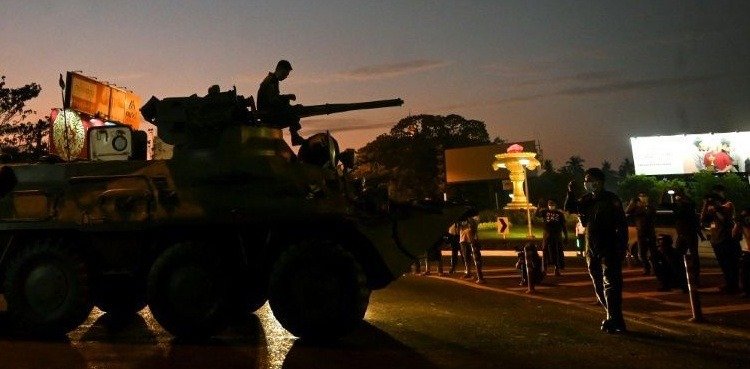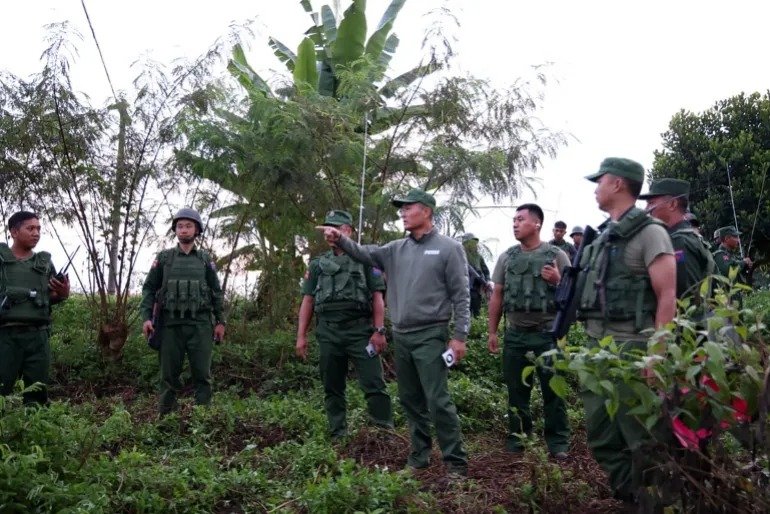Myanmar’s military junta has lost control of a vital border town to ethnic armed groups, in a major blow to the generals who seized power in a coup nearly three years ago.
The town of Chinshwehaw, on the border with China, was captured by an alliance of ethnic groups on Wednesday (November 1), after days of fierce fighting. The town is a key trade hub, and its loss is a setback for the junta’s efforts to consolidate its power.
You can also read: Myanmar Military’s Deadly Assault Shatters Kachin Villager’s Lives
The alliance of ethnic groups, which includes the Myanmar National Democratic Alliance Army (MNDAA), the Ta’ang National Liberation Army (TNLA), and the Arakan Army (AA), has been fighting the junta since it seized power in February 2021. The groups have been gaining ground in recent months, and the capture of Chinshwehaw is their biggest victory to date.
The junta has confirmed the loss of Chinshwehaw. “Government, administrative organisations and security organisations are no longer present” in Chinshwehaw, government spokesman Zaw Min Tun said on November 1.
The loss of Chinshwehaw is a setback for China’s Belt and Road infrastructure project. China is planning to build a billion-dollar rail link through northern Shan state, and the capture of Chinshwehaw by ethnic armed groups could disrupt those plans.
More than a quarter of Myanmar’s $1.8bn border trade with China passed through Chinshwehaw from April to September, state media reported in September, citing the Ministry of Commerce.
China has called for an “immediate” ceasefire in northern Shan state, but it is unclear whether the junta or the ethnic armed groups are willing to comply. The fighting is likely to continue, and the junta’s grip on power is likely to weaken further in the coming months.
Ethnic Armed Groups Gain Control in Northern Shan State
The Myanmar National Democratic Alliance Army (MNDAA), the Ta’ang National Liberation Army (TNLA) and the Arakan Army (AA) said on Thursday (November 2) they also had control over the towns of Hpaung Seng, Hsenwi, and Kyukok.
The groups, which are believed to have 15,000 fighters, have regularly battled with Myanmar’s military over demands for autonomy and resources. Clashes were ongoing in Kunlong and Hsenwi, the statement said, without giving details on casualties.

The rebels said they have killed and wounded dozens of soldiers, but the military government did not provide any casualty figures. China called on Thursday for an “immediate” ceasefire in northern Shan state, home to a planned billion-dollar rail link in its Belt and Road infrastructure project.
Thousands displaced
The United Nations said on Thursday (November 2) that it fears thousands of people have been displaced by the fighting in Myanmar’s northern Shan state, with some fleeing across the border into China.
A resident of Hsenwi, about 90km (55 miles) west of Chinshwehaw, told the Agence France-Presse news agency on Thursday that they could hear fighting going on outside the town, where thousands of people have sought refuge, reports AFP.
Myanmar’s borderlands are home to more than a dozen ethnic armed groups, some of which have fought the military for decades over autonomy and control of lucrative resources.
On February 1, 2021, Myanmar’s army removed the de facto head of the government, Aung San Suu Kyi, and other democratically elected leaders and took power.

The coup plunged Myanmar into crisis after the generals responded to mass protests against their power grab with brutal force, and opponents joined forces with fighters from long-established armed ethnic groups in a bid to restore civilian rule.
The United Nations has warned that Myanmar is facing a humanitarian crisis, with millions of people in need of food, shelter, and medical care. The organization has called on the military junta to end the violence and allow humanitarian aid to reach those in need.
However, the junta has shown no signs of backing down. It has continued to crack down on dissent and has refused to allow humanitarian aid to reach many areas of the country.
The situation in Myanmar is complex and there is no easy solution. However, it is clear that the military junta’s actions are having a devastating impact on the country’s people. The international community must continue to pressure the junta to end the violence and allow humanitarian aid to reach those in need.
New Round of Sanctions
The United States, Canada, and the United Kingdom announced new sanctions on October 31, aligning their measures to put more pressure on the junta and stop its flow of arms and revenue.
The US Treasury Department said it was imposing a financial blocking action against the Myanmar Oil and Gas Enterprise (MOGE), the military’s single largest source of foreign revenue. The move will freeze MOGE’s assets in the US and prevent American companies from doing business with it.
The sanctions were welcomed by Myanmar’s opposition National Unity Government (NUG), which is spearheading the resistance to military rule. NUG Human Rights Minister Zin Mar Aung said that the step was “important” but that “much more” could be done to combat the junta.
The sanctions are the latest in a series of measures taken by the West to punish the junta for its coup and its brutal crackdown on dissent. The junta has responded by further isolating the country and tightening its grip on power.
It is unclear how effective the new sanctions will be in pressuring the junta to change its behavior. However, they are a sign that the West is not willing to give up on Myanmar and that it will continue to support the country’s people in their fight for democracy.


